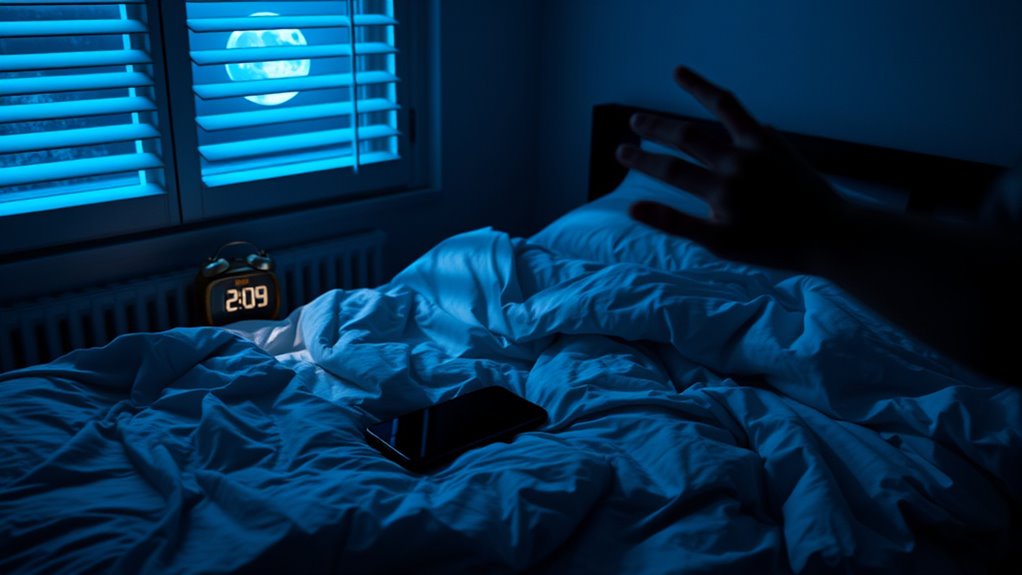Social jetlag occurs when your sleep schedule shifts between weekdays and weekends, causing your internal clock to fall out of sync with natural light cycles. This misalignment leads to grogginess, reduced alertness, and poor sleep quality, impacting your health over time. To minimize these effects, keep consistent sleep times and avoid abrupt schedule changes. If you want to understand how to protect your sleep and well-being, you’ll find helpful insights ahead.
Key Takeaways
- Social jetlag is a mismatch between your internal body clock and social schedules, often caused by weekend sleep shifts.
- It disrupts circadian rhythms, reducing sleep quality and leading to grogginess, fatigue, and mood swings.
- Irregular sleep patterns weaken hormonal regulation, making mornings difficult and decreasing alertness during the week.
- Long-term, social jetlag may contribute to metabolic issues, immune system weakening, and overall health risks.
- Maintaining consistent sleep and wake times aligned with natural light can minimize social jetlag’s impact.

Social jetlag is a phenomenon where your internal body clock becomes misaligned with your social schedule, often leading to fatigue and disrupted sleep patterns. This misalignment, known as circadian misalignment, occurs when your sleep-wake cycle doesn’t match the natural light-dark rhythm your body expects. You might find yourself staying up late on weekends and sleeping in, trying to catch up on rest. These weekend sleep shifts, however, can throw off your circadian rhythm even further. Instead of resetting your internal clock, they create a kind of jetlag without leaving town. When you sleep in on weekends, your body’s internal clock gets confused, making it harder to wake up refreshed during the week. This pattern can lead to a cycle of fatigue, reduced alertness, and even mood swings. Additionally, consistent sleep schedules help regulate your sleep hormones, which are essential for quality rest and overall health. Your body thrives on consistency. When you regularly shift your sleep times, especially with weekend sleep shifts, your circadian system struggles to adapt. The natural light cues that help regulate your internal clock become less effective, causing circadian misalignment. As a result, you might feel groggy in the mornings, struggle to stay awake during the day, or have trouble falling asleep at night. Over time, these disruptions can contribute to poor sleep quality and, potentially, long-term health issues like metabolic problems or weakened immune function. The key problem is that your body’s internal clock is designed for regularity, not for abrupt changes on weekends. Understanding this, you might realize why you often feel sluggish after weekends or why it’s so hard to get back into a routine. The weekend sleep shifts throw your circadian rhythm off course, making Monday mornings particularly difficult. Your body isn’t getting the consistent signals it needs to produce sleep hormones at the right times. This misalignment hampers your ability to fall asleep and wake up naturally. Instead of feeling rested and energized, you may feel drained and out of sync. To combat circadian misalignment caused by weekend sleep shifts, it’s best to keep your sleep schedule as consistent as possible, even on days off. Establishing regular bedtimes and wake times helps your internal clock stay in sync with the natural light cycle, reducing the effects of social jetlag.
Frequently Asked Questions
Can Social Jetlag Affect Mental Health?
Social jetlag can definitely affect your mental health. When your circadian rhythm gets disrupted due to inconsistent sleep schedules, it leads to circadian disruption, which often results in mood disturbances. You might find yourself feeling more anxious, depressed, or overwhelmed. Maintaining a regular sleep pattern helps stabilize your circadian rhythm, reducing mood issues and supporting better mental well-being. Pay attention to your sleep habits to protect your mental health.
How Is Social Jetlag Measured?
They say, “what gets measured gets managed.” To measure social jetlag, you compare your sleep timing on workdays versus free days. You can use sleep diaries to record sleep and wake times or analyze biological markers like melatonin levels. This difference indicates your social jetlag, revealing how your lifestyle disrupts your natural rhythm. Accurate measurement helps you understand and address your sleep schedule’s impact on health.
Does Age Influence Susceptibility to Social Jetlag?
Age definitely influences your susceptibility to social jetlag. As you age, your sleep patterns change, often making you more prone to disruptions from social schedules. Younger individuals tend to adapt better, but susceptibility can vary across your lifespan. You might find that certain ages make it harder to align your biological clock with social demands, increasing the risk of sleep disturbances and health issues related to social jetlag.
Can Social Jetlag Be Reversed?
Yes, social jetlag can be reversed by improving your sleep consistency and avoiding relying solely on weekend recovery sleep. You can gradually shift your sleep schedule to match your natural circadian rhythm, ensuring consistent bedtimes and wake times throughout the week. This helps reset your internal clock, reducing social jetlag’s effects and promoting better overall sleep health. Stick to a routine, even on weekends, to maintain the benefits.
What Are the Long-Term Health Effects of Social Jetlag?
You might wonder about the long-term health effects of social jetlag. It causes circadian disruption, which can lead to hormonal imbalance, increasing your risk for metabolic issues, heart disease, and mental health problems. Over time, this misalignment affects your body’s overall function, making it harder to maintain health. Addressing social jetlag by regular sleep schedules helps restore balance, reducing these risks and supporting your long-term wellness.
Conclusion
Think of social jetlag as a sneaky thief stealing your precious sleep, leaving you tired and off-balance. By understanding its tricks, you can reclaim your nights and restore harmony to your body’s natural rhythm. Don’t let this silent disruptor steer your life off course—take control, set your internal clock straight, and sail smoothly through each day. Your best energy and well-being are waiting just beyond the horizon, ready to light your path back to balance.









